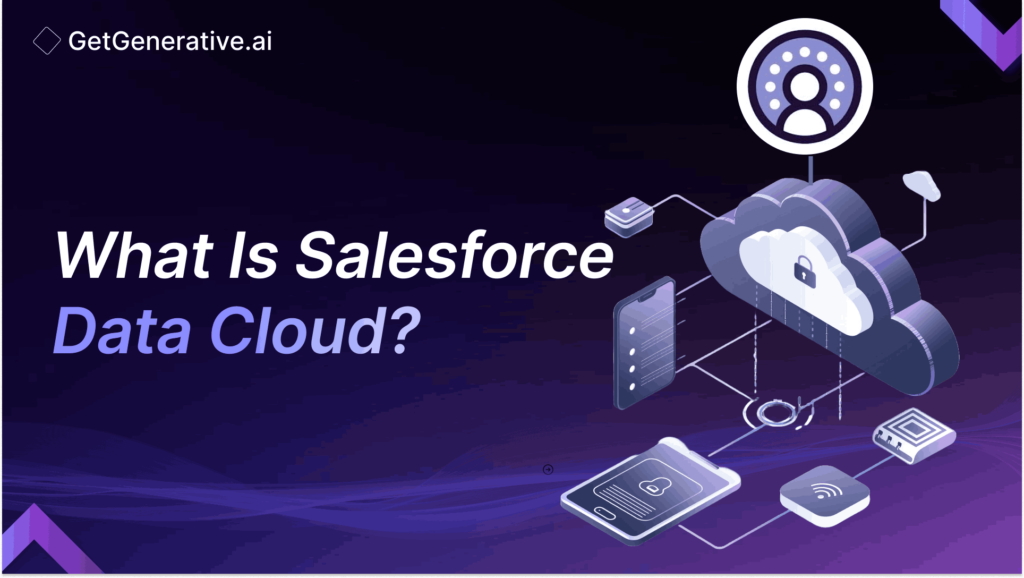What Is Salesforce Data Cloud?
In today’s data-driven world, businesses generate and rely on vast data to make informed decisions and drive growth. IDC states the global data sphere is expected to reach 175 zettabytes by 2025. As organizations seek to harness this data effectively, Salesforce Data Cloud emerges as a pivotal tool, offering robust data management, integration, and analytical capabilities.
In this blog, we will explore Salesforce Data Cloud, how it works, and the myriad benefits it offers to businesses.
What is Salesforce Data Cloud?
Salesforce Data Cloud is a powerful, scalable platform for managing and analyzing vast data. It provides businesses the tools to collect, store, and process data from various sources, delivering actionable insights and enhancing decision-making processes. By leveraging the capabilities of the Data Cloud, organizations can unlock the full potential of their data, driving innovation and competitive advantage.
How Data Cloud Works
Salesforce Data Cloud is a comprehensive data management platform designed to handle vast amounts of data efficiently and effectively. Here’s a closer look at how it functions:
Data Ingestion
1. Multiple Data Sources:
- Internal Sources: Data from Salesforce CRM, ERP systems, and internal databases.
- External Sources: Social media platforms, third-party applications, IoT devices, and more.
2. Data Collection Methods:
- APIs and Connectors: Salesforce Data Cloud uses robust APIs and pre-built connectors to streamline data ingestion from various sources.
- Batch and Streaming: Supports batch processing for large volumes of data and real-time streaming for immediate data capture.
Data Storage
1. Centralized Repository:
- Scalability: The platform’s storage solution is designed to scale according to the volume of data, ensuring that businesses can store massive datasets without performance degradation.
- High Availability: Ensures data is always accessible, minimizing downtime and enhancing reliability.
2. Data Formats:
- Structured Data: SQL databases, CSV files, etc.
- Unstructured Data: Emails, social media posts, log files, etc.
Data Processing
1. ETL Processes:
- Extract, Transform, Load (ETL): Data is extracted from various sources, transformed into a usable format, and loaded into the centralized repository.
- Data Cleaning and Transformation: Ensures data consistency, accuracy, and compatibility across different sources.
2. Real-Time Processing:
- Stream Processing: Real-time analytics and insights from streaming data sources.
- Event-Driven Architecture: Immediate processing and response to data events as they occur.
Also Read – Salesforce Data Cloud Consultant: The Role and Importance
Data Analysis
1. Advanced Algorithms:
- Machine Learning Models: Use of sophisticated algorithms to identify patterns, trends, and anomalies in the data.
- Predictive Analytics: Forecasting future trends based on historical data.
2. Analytical Tools:
- Dashboards and Reports: Customizable dashboards and detailed reports for visualizing data insights.
- Data Visualization: Tools to create interactive charts, graphs, and other visual data representations.
Data Security
1. Encryption:
- Data at Rest: Encryption of stored data to prevent unauthorized access.
- Data in Transit: Secure transmission of data using encryption protocols.
2. Access Controls:
- Role-Based Access: Permissions and access levels are based on user roles within the organization.
- Audit Trails: Tracking data access and modifications for security and compliance purposes.
Integration and API Management
1. Seamless Integration:
- Salesforce Ecosystem: Native integration with tools like Sales Cloud, Service Cloud, and Marketing Cloud.
- Third-Party Applications: Compatibility with various third-party applications and services.
2. API Management:
- Robust APIs: Facilitate data exchange and integration with other systems.
- Developer Tools: Resources and tools for developers to build custom integrations and applications.
Benefits of Data Cloud
- Scalability: Salesforce Data Cloud can handle massive volumes of data, making it suitable for businesses of all sizes.
- Real-time Insights: Organizations can make timely and informed decisions with real-time data processing capabilities.
- Enhanced Collaboration: Data Cloud fosters collaboration across departments by providing a unified data platform.
- Cost Efficiency: By consolidating data management into a single platform, businesses can reduce costs associated with maintaining multiple systems.
- Improved Customer Experience: Personalized insights derived from data can enhance customer interactions and drive satisfaction.
How Salesforce Uses Data Cloud
Salesforce leverages Data Cloud to enhance its suite of products and services. For instance, it integrates Data Cloud with Salesforce Customer 360 to provide a comprehensive view of customer data, enabling businesses to deliver personalized experiences. Additionally, Salesforce uses the platform to power its AI and analytics capabilities, offering its users deeper insights and predictive analytics.
How Does Data Cloud Integrate with Existing Salesforce Tools?
Salesforce Data Cloud integrates with existing tools, such as Sales Cloud, Service Cloud, and Marketing Cloud. This integration allows businesses to leverage their existing investments in Salesforce while enhancing their data management and analytical capabilities. The unified platform ensures data flows smoothly across different tools, providing a consistent and comprehensive view of business operations.
Also Read – Salesforce Data Cloud Implementation Guide
How Does Data Cloud Handle Data from Third-Party Sources?
Salesforce Data Cloud is designed to ingest and process data from various third-party sources. It supports multiple data formats and protocols, ensuring businesses can integrate data from external systems, such as social media platforms, e-commerce sites, and IoT devices. The platform’s robust APIs and connectors facilitate seamless data integration, enabling organizations to enrich their datasets and gain a holistic view of their operations.
What Kind of Data Streams Can Be Connected to Data Cloud?
Salesforce Data Cloud supports a diverse array of data streams, including:
- Customer interactions from CRM systems
- Transactional data from ERP systems
- Social media feeds
- IoT sensor data
- Web and mobile analytics
- Marketing campaign data This versatility allows businesses to capture a comprehensive set of data points, driving more accurate and insightful analysis.
How Does Data Cloud Enhance AI Capabilities in Salesforce?
Salesforce Data Cloud enhances AI capabilities by providing a robust data foundation for AI and machine learning models. The platform’s advanced data processing and analytics tools enable the creation of sophisticated models that can predict trends, identify patterns, and deliver actionable insights.
This integration empowers businesses to leverage AI for various applications, such as customer segmentation, predictive maintenance, and sales forecasting.
Also Read – Data Cloud Glossary of Terms: An Ultimate Guide
Conclusion
Salesforce Data Cloud represents a significant advancement in data management and analytics. Providing a scalable, secure, and integrated platform empowers businesses to harness the full potential of their data. From enhancing AI capabilities to improving customer experiences, Data Cloud offers many benefits that drive growth and innovation.
Enhance your Salesforce consulting with GetGenerative.ai. Effortlessly craft outstanding proposals, enabling you to dedicate more time to providing exceptional client service.
Start today!
Frequently Asked Questions (FAQs)
1. What types of businesses can benefit from Salesforce Data Cloud?
Salesforce Data Cloud suits businesses of all sizes and across various industries, including retail, finance, healthcare, and manufacturing.
2. How does Salesforce Data Cloud ensure data security?
To protect data, Salesforce Data Cloud employs robust security measures, including encryption, access controls, and compliance with industry standards.
3. Can Salesforce Data Cloud handle real-time data processing?
Yes, Salesforce Data Cloud supports real-time data processing, enabling businesses to make timely and informed decisions.
4. How does Salesforce Data Cloud integrate with third-party applications?
Salesforce Data Cloud offers APIs and connectors facilitating seamless integration with third-party applications and data sources.
5. What are the key benefits of using Salesforce Data Cloud?
The key benefits include scalability, real-time insights, enhanced collaboration, cost efficiency, and improved customer experience.




